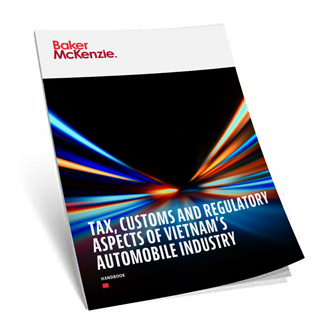Vietnam’s automotive industry has experienced steady progress in recent years. With Vietnam having a population of nearly 100 million and a sustainable economy, this growth trend is expected to continue.
The development of Vietnam’s automotive industry remains one of the government’s main focuses, with new laws and policies to promote the development of this industry.
Baker McKenzie’s new publication, Tax, Customs and Regulatory Aspects of Vietnam’s Automobile Industry, aims to provide an initial view of key legal aspects that affect Vietnam’s automobile industry.
Key takeaways from the report
- Tax incentives, preferential tariff treatment and customs procedure: Import duty matrix under current Free Trade Agreements (FTAs), and tax policies relating to the automobile industry.
- Licensing and approval for automobile manufacture/assembly and trading: Overview of regulatory conditions and compliance issues for automobile manufacturers and traders.
- Production, product quality and post-sale services: An automobile manufacturer must follow quality inspection procedures on technical safety and environmental protection and obtain a Type Approval Certificate for the automobile model. This certificate is the fundamental document that allows the manufacturer to proceed with the manufacture of an automotive model. After that, for every automobile of the same model, the manufacturer will need to issue a Certificate of Conformity to certify that the automobile has passed the final conformity inspection. This certificate will be used by the consumer for ownership registration.
- Automobile distribution: Overview of labelling regulations, and procedures for car ownership registration.




